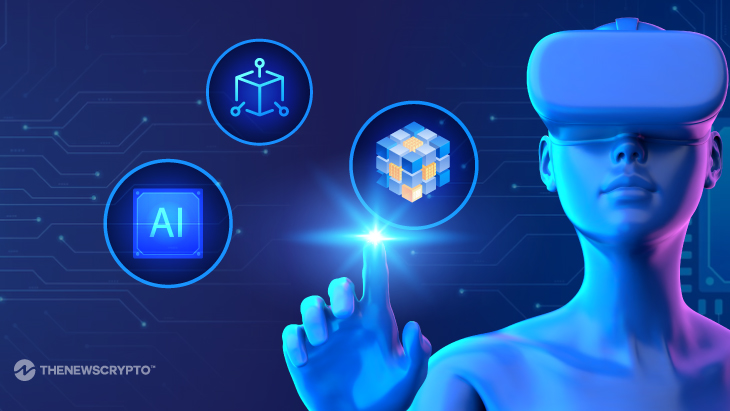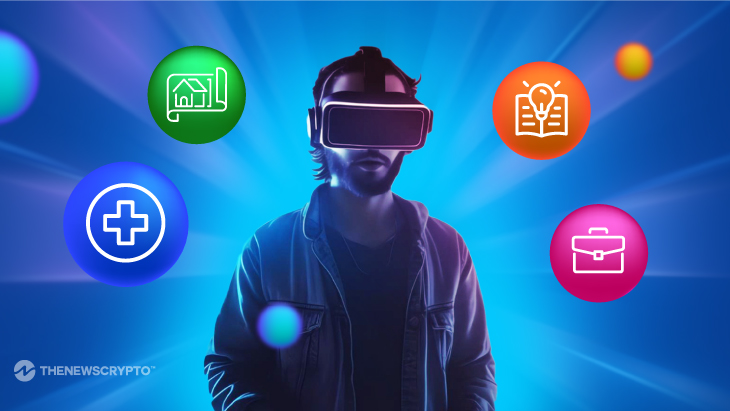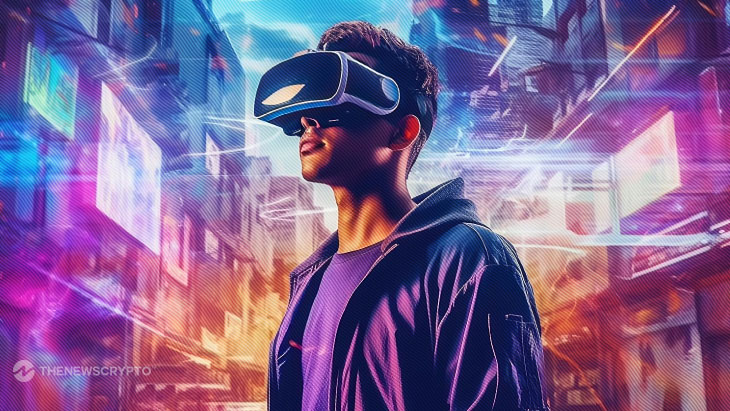What Does Metaverse Mean?
The concept of the metaverse envisions an advanced form of the Internet where users can immerse themselves in 3D virtual environments, connected to create a persistent virtual universe, surpassing the limitations of physical space and time with the help of computers, VR technology, and 3D user interfaces.
The inception of the term “metaverse” can be attributed to author Neal Stephenson, who coined it in his 1992 science fiction novel Snow Crash. The technologies that serve as the building blocks for a virtual reality-centric internet have been in development for several decades, tracing their origins back to earlier periods.
Mark Zuckerberg’s vision for the metaverse suggests that it will fundamentally change the way we engage with the world online. And bringing existing social media platforms together in a cohesive and immersive environment.
The rapid advancement of technologies such as VR headsets and AR glasses has made accessing the virtual world increasingly feasible. However, certain fundamental components of the metaverse, such as sufficient bandwidth and universally accepted interoperability standards, may still be years away or even prove to be unattainable.
Features of the Metaverse

The Metaverse operates through a multitude of key features, each contributing to its intricate workings and immersive nature. Let’s delve into some of these notable features:
Avatars
One of the fundamental ideas behind the Metaverse is the creation of digital avatars. That enables individuals to express their unique emotions and feelings. These avatars represent personalized digital identities, ranging from static to animated forms. Digital avatars offer an unparalleled opportunity for self-expression. That allowing for precise replicas of one’s actual appearance, the embodiment of beloved celebrities, or the imaginative exploration of entirely original characterizations.
Immersive Experiences
In the Metaverse, participants can enjoy heightened levels of immersion that merge reality with the virtual world through the utilization of mixed reality and AR/VR technologies. AR and VR form the fundamental building blocks for Metaverse endeavors. Augmented reality systems depend on three key components: seamless connectivity between the physical and virtual domains, real-time interaction functionalities, and accurate rendering of 3D objects.
Blockchain-Based Operations
Blockchain plays a vital role in the Metaverse by empowering consumers to protect their virtual assets and establish verifiable ownership. This technology provides digital proof of ownership and becomes a crucial component within the Metaverse as data volume, value, and security become increasingly significant. The incorporation of blockchain skills and technology ensures the validity of data in the Metaverse, while artificial intelligence is employed to safeguard its diversity and rich content. By avoiding centralized data storage systems, the blockchain-based Metaverse allows unrestricted access to a multitude of digital realms.
Artificial Intelligence (AI)
AI plays a pivotal role in the Metaverse, spearheading corporate research efforts in various domains such as content analysis, self-supervised speech processing, robotic interactions, computer vision, and whole-body posture estimation. AI-powered chatbots are becoming increasingly prevalent among organizations. And in the context of the Metaverse, these bots take the form of lifelike avatars and serve various roles, such as sales, marketing, and customer support.
Social Interactions
Within the Metaverse, human communication and interaction occur through the use of avatars and visual representations, allowing users to engage and converse with both the Metaverse itself and other users. These exchanges take place within cyberspace, which acts as a virtual representation of the real world.
Why is The Metaverse Important?
The term “Metaverse” gained significant popularity after Facebook’s rebranding as Meta in October 2021, accompanied by their announcement of a minimum $10 billion investment in the concept for that year. Notably, other tech giants like Google, Microsoft, Nvidia, and Qualcomm are also making substantial investments in the Metaverse. And contributing billions of dollars to its development.
Companies currently employ the term “metaverse” to encompass a multitude of enhanced online environments. This includes online video games like Fortnite, evolving virtual workplaces such as Microsoft’s Mesh or Meta’s Horizon Workrooms, and even applications like virtual dressing rooms and operating rooms. The breadth of its application highlights the diverse nature of the metaverse concept in today’s business landscape.
The metaverse heavily relies on the progress of virtual reality (VR) and augmented reality (AR) technologies, considering them essential for its development and growth.
Virtual Reality (VR)
VR immerses users in a computer-generated 3D environment that simulates reality by replicating our senses. To access this virtual realm, individuals typically wear a VR headset that envelops their entire field of vision. Incorporating haptic feedback devices like gloves, vests, and full-body tracking suits enhances the level of interaction within the virtual environment, enabling users to engage with the virtual world in a more lifelike manner.
Augmented Reality (AR)
AR provides a less immersive experience in comparison to virtual reality (VR) by superimposing digital overlays onto the real world via a lens or display. Users can continue to interact with their actual surroundings while simultaneously observing and engaging with digital content. The game Pokémon Go stands as an early demonstration of AR, and well-known consumer AR products include Google Glass and heads-up displays featured in car windshields.
The Metaverse landscape saw a noteworthy development on June 5, 2023, as Apple unveiled its foray into Spatial computing through the introduction of Apple Vision Pro. This introduction has generated speculation about the potential impact of Apple Vision Pro on the future of the Metaverse.
The Potential Impact of the Apple Vision Pro Headset on the Metaverse
The introduction of Apple Vision Pro marks a revolutionary advancement in spatial computing, bridging the gap between the digital and physical domains. This cutting-edge device enables users to seamlessly interact and communicate within this combined space. With its immersive 3D display and intuitive user control, the Vision Pro provides an unparalleled user experience. Setting itself apart from traditional VR and AR headsets, the Vision Pro operates as a Mixed Reality (MR) headset, eliminating the need for handheld input devices. Users can effortlessly navigate the device using their voice commands, eye movements, and hand gestures.
While the Vision Pro and other VR & AR devices associated with the Metaverse share similar features. Apple’s innovative device represents an expansion of existing technology. Although some media platforms have portrayed Vision Pro as a potential threat to the Metaverse, it is more probable that it will assist the Metaverse in reaching new heights and accomplishing its ambitious objectives.
What Is the Role of NFTs in the Metaverse?
NFTs are poised to play a significant role in the metaverse. Offering a secure and verifiable method of owning and trading digital assets. By utilizing blockchain technology, NFTs provide a unique and immutable record of ownership for items such as art, music, and virtual properties within the metaverse. These digital deeds allow for the creation of a thriving economy. That users can buy, sell, and showcase their digital possessions, enhancing the overall experience within the metaverse.
The metaverse’s expanding landscape has attracted the attention of not only emerging players like Metaverse Group. Also established brick-and-mortar corporations. Nike’s strategic move to acquire RTFKT exemplifies this, as the renowned company taps into the metaverse’s possibilities, incorporating NFTs, blockchain authentication, and augmented reality to produce exclusive virtual sneakers and digital artifacts.
To solidify its position in the metaverse, Nike demonstrated its commitment through the submission of seven trademark applications. That aimed at developing and selling virtual sneakers and apparel. Additionally, the collaboration between Nike and Roblox resulted in the birth of “Nikeland,” a virtual world that offers an immersive experience for Nike fans. Within Nikeland, users can partake in games, socialize, and style their avatars with a wide range of virtual clothing options.
How is the Metaverse Transforming Various Industries?

In today’s digital landscape, the integration of advanced technologies like the Metaverse has become essential for businesses across every industry and sector. The increasing consumer demand for superior experiences has compelled organizations to embrace digitalization and leverage emerging technologies to stay competitive.
As the metaverse continues to expand, a diverse range of job opportunities has emerged. Leading to a surge in demand for metaverse specialists and the establishment of metaverse certification programs. To stay ahead of the curve, numerous companies have proactively started training their employees to equip them with the necessary expertise. Anticipating the profound impact the metaverse will have on industries across the board.
E-Commerce and Retail
The metaverse is positioned as the next significant retail frontier, with the potential to mirror the explosive success of e-commerce giants like Amazon, eBay, and Shopify, drawing in millions of users daily. Leveraging the power of 3D and AR, customers can gain a more immersive and accurate representation of potential purchases, leading to well-informed decisions and fewer product returns. As online retailers embrace these cutting-edge technologies, the shift towards VR and the metaverse becomes increasingly imminent.
Media and Entertainment
Just as traditional media, social media, live TV, and online streaming have provided channels for content creation and consumption, the metaverse represents yet another means of engaging in these activities. Transcending physical constraints not only fulfills our inherent human desire for connection. Also enables us to share experiences and narratives. The world’s largest media and entertainment companies, including Disney, are proactively seeking ways to connect and engage with their fans and audiences through metaverse experiences and events.
Manufacturing
The introduction of 3D rendering and simulation capabilities marked a turning point for the industry, particularly in manufacturing. With the multifaceted logistical and technical components involved, today’s manufacturing strategies are tailored to optimize for different objectives.
Virtual inspection empowers manufacturers to seamlessly identify and resolve product flaws, enabling them to optimize the engineering process and minimize costly revisions. This results in significant time and cost savings for companies. Virtual training in the metaverse revolutionizes manufacturing by enabling technicians to learn in immersive environments. Employees can safely operate machines and handle hazardous equipment, making training new hires easier and eliminating health-related risks.
Healthcare
The concept of remote healthcare is transforming the healthcare industry. Offering medical services to individuals in geographically remote or underserved areas. Those who face limitations in visiting healthcare providers can now access consultations through remote healthcare assistance. In the metaverse, both patients and healthcare providers have convenient access to real-time patient data, enabling accurate diagnoses. Moreover, psychiatrists and psychologists can create immersive environments within the metaverse to provide aversion therapy for individuals with mental illness.
Banking and Finance
The metaverse is witnessing the significant integration of blockchain and cryptocurrencies, revolutionizing the virtual economy. This transformative development will completely transform the way individuals manage and engage with their finances. Non-fungible tokens (NFTs) and cryptocurrencies enable individuals to engage in transactions and buy and sell virtual assets within the metaverse. Additionally, banks can establish crypto-based financial institutions. That offer customers the convenience of conducting banking activities without the need for physical visits to a branch.
The Future of the Metaverse
It is important to highlight that the metaverse is currently a realm of possibilities rather than a concrete reality. Numerous uncertainties surround its eventual manifestation, including questions about control, scope, and the extent of its impact on our daily lives. The future of the metaverse, encompassing who will govern it and the experiences it will offer, remains a topic of ongoing debate. Supporters envision a metaverse that enriches our lives, granting us experiences that are beyond the limitations of the physical world.
Albeit, The influence of AR and VR technology is already noticeable in diverse industries. Including manufacturing, gaming, entertainment, real estate, healthcare, and education, where it plays a critical role in specific processes. However, it is essential to acknowledge that technology has not yet reached the transformative power and widespread adoption witnessed with smartphones.
Additionally, the emergence of the metaverse will create diverse employment opportunities. Including roles for digital artists specializing in creating visually appealing 3D architecture. In the coming years, the metaverse will become more accessible with the advent of VR goggles, allowing individuals to effortlessly immerse themselves in this virtual realm.
The ability to blend physical objects with digital elements, utilizing the attributes of real-world objects through the creation of digital twins, is poised to be an extraordinary, transformative, and immersive phenomenon, unparalleled in its impact. Consequently, the allure of the metaverse will generate a heightened desire to purchase digital assets. That driving a surge in participation within the profitable cryptocurrency market. As a result, the virtual world will witness significant growth in both accessibility and digital legitimacy.
Recommended For You:








